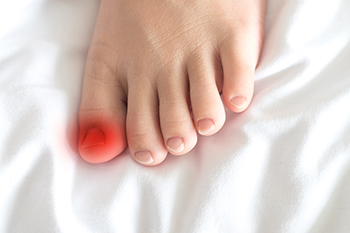
Drexel Hill (484) 521-0233
West Chester (610) 436-5883

Drexel Hill (484) 521-0233
West Chester (610) 436-5883

An ingrown toenail is one of the most painful foot conditions to have. It happens when the nail grows into the skin instead of over it. This can happen for various reasons including wearing shoes and socks that are too tight, cutting the toenail incorrectly, and possibly from a toe injury. Some patients develop an ingrown toenail because of the shape of the nail or from poor foot hygiene. Diabetic people may be prone to ingrown toenails because of reduced blood flow to the feet. Additionally, experiencing toenail fungus frequently may lead to an ingrown toenail, and this can cause the nail to become brittle and put pressure on the surrounding skin. Many people are unaware that having poor posture may put extra weight on the toes too, therefore increasing the chances of getting an ingrown toenail. If you have existing or recurring ingrown toenails, it is strongly suggested that you consult a podiatrist who can offer you relief and treatment techniques.
Ingrown toenails can become painful if they are not treated properly. For more information about ingrown toenails, contact the podiatrists of Dr. Siegerman & Associates. Our doctors can provide the care you need to keep you pain-free and on your feet.
Ingrown Toenails
Ingrown toenails occur when a toenail grows sideways into the bed of the nail, causing pain, swelling, and possibly infection.
Causes
Prevention
Because ingrown toenails are not something found outside of shoe-wearing cultures, going barefoot as often as possible will decrease the likeliness of developing ingrown toenails. Wearing proper fitting shoes and using proper cutting techniques will also help decrease your risk of developing ingrown toenails.
Treatment
Ingrown toenails are a very treatable foot condition. In minor cases, soaking the affected area in salt or antibacterial soaps will not only help with the ingrown nail itself, but also help prevent any infections from occurring. In more severe cases, surgery is an option. In either case, speaking to your podiatrist about this condition will help you get a better understanding of specific treatment options that are right for you.
If you have any questions please feel free to contact one of our offices located in Drexel Hill and West Chester, PA . We offer the newest diagnostic and treatment technologies for all your foot and ankle needs.
Request a free copy of
Laser Away Foot Pain!
today.
